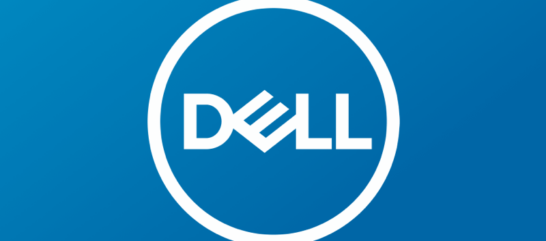A poor employer brand costs a company at least 10% more per hire, according to Harvard research. And that can really add up.
In fact, an organization with 10,000 employees could spend as much as $7.6 million in additional wages to compensate for a bad reputation.
And when the bottom line is impacted, that affects the entire company.
Today, employer branding isn’t simply an HR concern because if an organization can’t attract, hire, and retain the right people, the company itself is unlikely to achieve its business objectives.
That’s why it’s imperative that every member of your organization — from the intern to the CEO — be involved in building a strong employer brand.
Employer Branding is a Company-Wide Effort
Everyone at a company contributes to the organization’s reputation.
This is easy to see in some departments, such as marketing or branding, which are responsible for external messaging, but it’s true of all parts of an organization.
The way sales and customer success interact with current and prospective buyers affects how those customers view the company. What leadership posts on social media affects brand perception, as does the Glassdoor review the intern leaves.
And how all of these things contribute to — or detract from — the company’s mission and values is important as well.
Because of this, your employer brand is truly an extension of the established company brand. It shouldn’t be a separate entity handled exclusively by HR, but instead it should be viewed as a facet of the overall brand that everyone plays a part in.
However, there’s too often a disconnect between employer brand and corporate brand, which can be confusing for employees, customers, and the marketplace as a whole.
Sure, divisions of HR do the actual recruitment and hiring, but saddling HR with the sole responsibility for a company’s employer brand will backfire for many reasons.
- HR’s specialty is finding, hiring, and retaining the right talent — not building and communicating brand. After all, you rely on your HR team to hire people who specialize in branding and marketing; you don’t expect them to do it themselves.
- Your company’s leaders are the brand’s natural influencers that people look to as the face of the brand, so they’re communicating employer brand in everything they do whether they realize it or not.
- The most important contributors to employer branding are the employees themselves, so what they say and post about the company matters more than what leadership or HR has to say. In fact, candidates trust current employees three times more than the company itself to provide credible information about what it’s like to work there.
How to Get Started
Getting absolutely everyone involved in employer branding may sound overwhelming. But don’t worry — you don’t need to call a company-wide meeting.
To begin, you just need to realize that your employer brand is about far more than just employee perks or hiring practices and so it can’t be managed by human resources alone.
A powerful employer brand requires HR to work with marketing to create an employee experience that’s true to the corporate brand. And everyone — the C-suite, sales, engineers, frontline workers, interns, and more — must own their role in contributing to employer branding.
Ownership is key, so you may have someone from HR lead this charge. Or you may establish a task force composed of representatives from your HR, marketing, and branding departments.
Regardless, the person or team leading your employer branding efforts will be in charge of establishing a plan of action to get everyone involved.
Now, let’s take a look at what HR, marketing and branding, the C-suite, and all of your employees can do to build a solid employer brand.
Human Resources’ Role in Employer Branding
While your HR team isn’t solely responsible for the company’s employer brand, it still plays a vital role. Here’s how everyone involved in recruitment and hiring should be involved.
Create talent profiles.
Define not only the job qualifications for each position, but also the qualities you look for in candidates.
These talent profiles guide HR and management to make informed hiring decisions, ensuring that new hires can perform necessary job functions, as well as be a good fit for company culture.
When HR knows exactly what they want, they can more effectively communicate this via the employer brand.
Develop an employee value proposition — and put it into practice long-term.
Your employer brand should convey what sets your company apart from others and makes it a desirable place to work.
Your employee value proposition is an important aspect of this because it defines what employees receive — compensation, work-life balance, culture, onboarding, performance reviews, and more — in return for working for your company.
Research shows that employer brand is largely dependent on the long-term quality of employees’ work experience, but too often companies focus mostly on hiring and onboarding.
Defining your employee value proposition and ensuring that your company delivers on it throughout workers’ employment will be a major factor in your employer brand.
Revamp your careers page.
Eighty-nine percent of job seekers cite employers’ websites as a key source of information to learn more about the company, so make sure your careers page accurately communicates your employer brand.
When people arrive on the page, they should be able to immediately get a sense of your culture, so this is a great place to feature employee stories and highlight your employee value proposition like Qualtrics does.
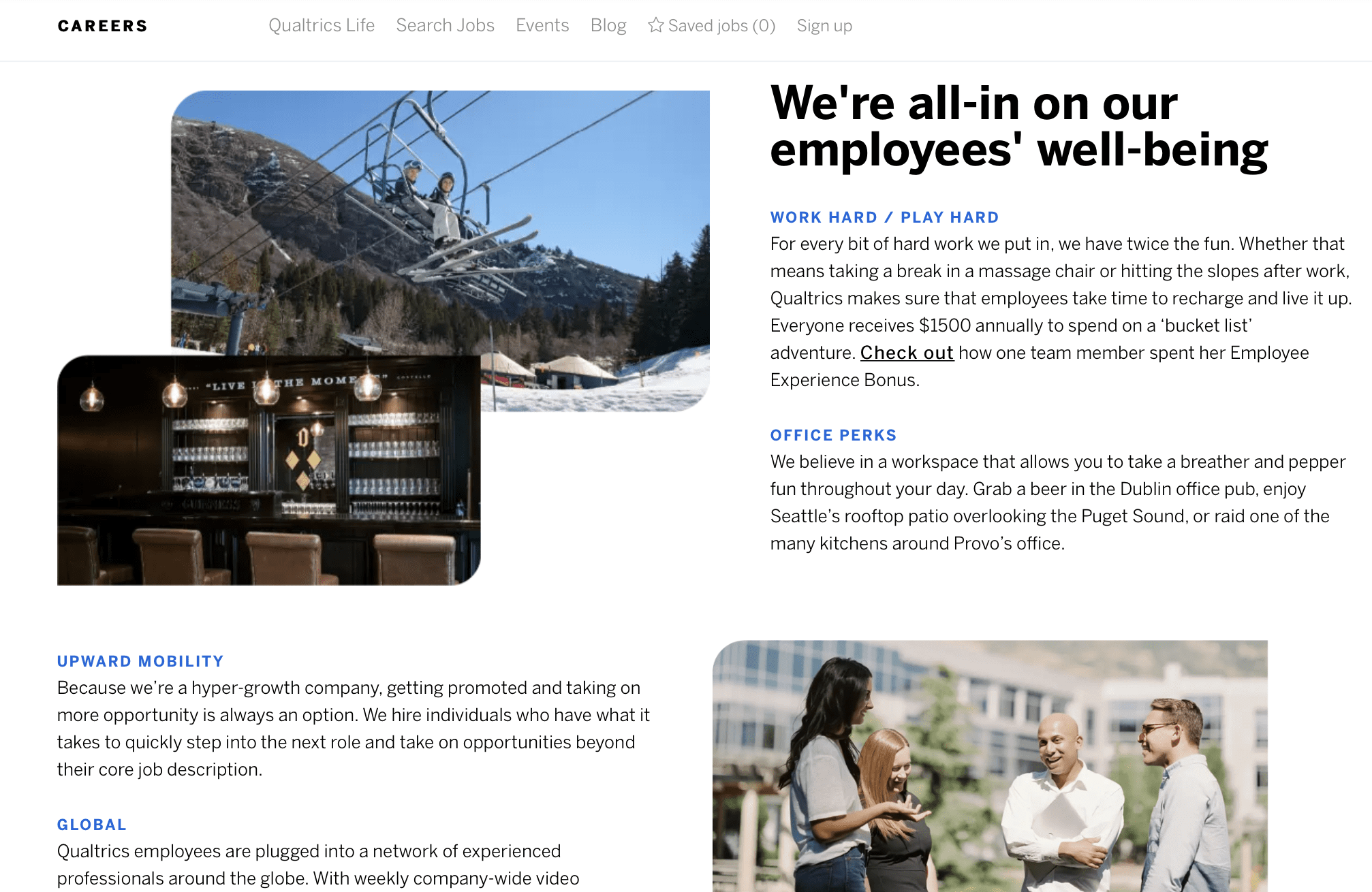
In addition to open positions, the page should feature information about what life is like at the organization, links to corporate social profiles, and easy ways for applicants to ask questions or submit their resume to become part of your recruitment network.
Gather feedback.
What employees think and say about an organization has the greatest impact on its employer brand, so HR needs to know if the company is actually delivering on the promises it makes. Because the truth is, most companies aren’t.
Only 19% of workers feel strongly that the work experience their company promotes is actually matched day-to-day. So it’s hardly surprising that nearly a third of new hires leave their company within the first six month.
Employers that deliver on the experience they promise not only retain employees, but also have higher engagement and better recruitment. Plus, their workers are stronger advocates who are more likely to praise their employer online and recommend their company as a great place to work.
So solicit employee feedback, conduct regular engagement surveys, engage in social listening, and audit reviews that current and former employees write about the company.
If you find there’s a discrepancy between how you want your organization to be viewed and what employees actually experience, take steps to bridge this gap.
Educate employees.
Every single member of the organization plays a role in employer branding, so HR needs to ensure that every employee understands this.
This should be explained in onboarding and communicated throughout the employee experience so workers are aware that what they say and post about the company affects not only the employer brand, but also the success of the business as a whole.
With this understanding comes responsibility and ownership, which can transform employees into true company and brand advocates.
Marketing’s Role in Employer Branding
Marketers know how to capture audiences’ attention, tell engaging stories, and create impactful brand experiences, so your marketing team is an essential part of building your employer brand.
Combine consumer and employer brand strategies.
Research shows that consumer-facing communications are increasingly important in shaping employer brand, so it makes sense to align these strategies when appropriate.
The companies that do this best highlight their employees and company culture in their consumer marketing efforts, which influences how people view the organization as an employer.
Share employee stories on social media.
One of the best places to employ this tactic is on social media because it enables your brand to reach a variety of audiences, including current and potential employees and customers.
Use these platforms to showcase employees, post their stories and successes, and share their employee-generated content.
This kind of content doesn’t only contribute to an authentic employer brand, but it also positively impacts employee engagement and morale.
Execute employer brand campaigns.
Once HR and marketing know what they want to communicate about their employer brand, marketing can take the lead on actually getting that message out to the right people.
For example, when software company SAP wanted to reach more young tech professionals with information about its employer brand, it created 40 employee story videos tailored to students and recent graduates.
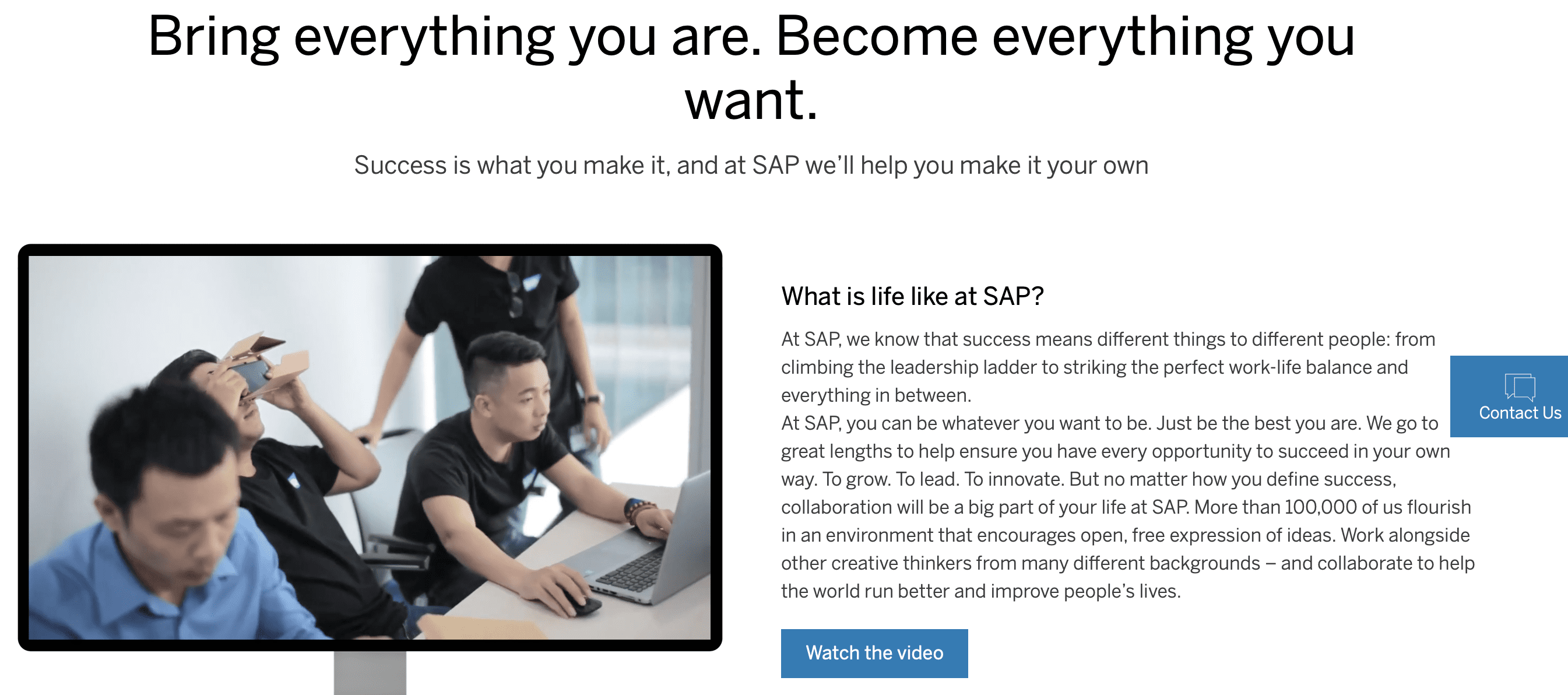
The company’s marketing team then launched the “Life at SAP” social media campaign to engage prospects on the very networks where their target demographic is active, including Instagram, YouTube, and LinkedIn.
Measure success.
Marketers know how to set up KPIs and measure campaign goals, so let your marketing team lead the way in measuring the success of your employer brand efforts.
Taking this step will put you ahead of the competition since fewer than a third of large organizations say they measure whether the company lives up to the employer brand promises it makes.
Meanwhile, the companies on the World’s Most Attractive Employers list were much more likely to measure employer brand through surveys, social media engagement, and recruitment marketing results.
Leadership’s Role in Employer Branding
The leaders of your company no doubt have a lot to do, but the organizations with the strongest and most attractive employer brands are the ones whose C-suite understands the importance of their role in employer branding.
Be active on social media.
There are numerous reasons why the C-suite should be posting, sharing, and engaging on social media. They’re the brand’s natural influencers, it makes them better leaders, and it expands thought leadership, just to name a few.
Your CEO or CMO’s LinkedIn or Twitter followers expect company leadership to provide insights into not only how the company is performing, but also what it’s like to work there.
So it’s important for leadership to give their followers a behind-the-scenes look at company culture, share employee stories and employee-generated content, and engage with users on social because this has a significant impact on employer brand.
Lead by example.
Sixty percent of CEOs believe that the primary responsibility of the employer brand lies with the CEO, which Harvard Business Review says is “a strong indication that employer branding is expected to gain greater strategic importance.”
If your company’s leadership doesn’t share this belief, it’s time to get them on board and help them understand that it’s essential for them to be the face of your employer branding efforts.
Leadership can do this by getting involved in day-to-day company events, engaging with employees via your employee advocacy program, being active on social media, and participating in employer branding campaigns.
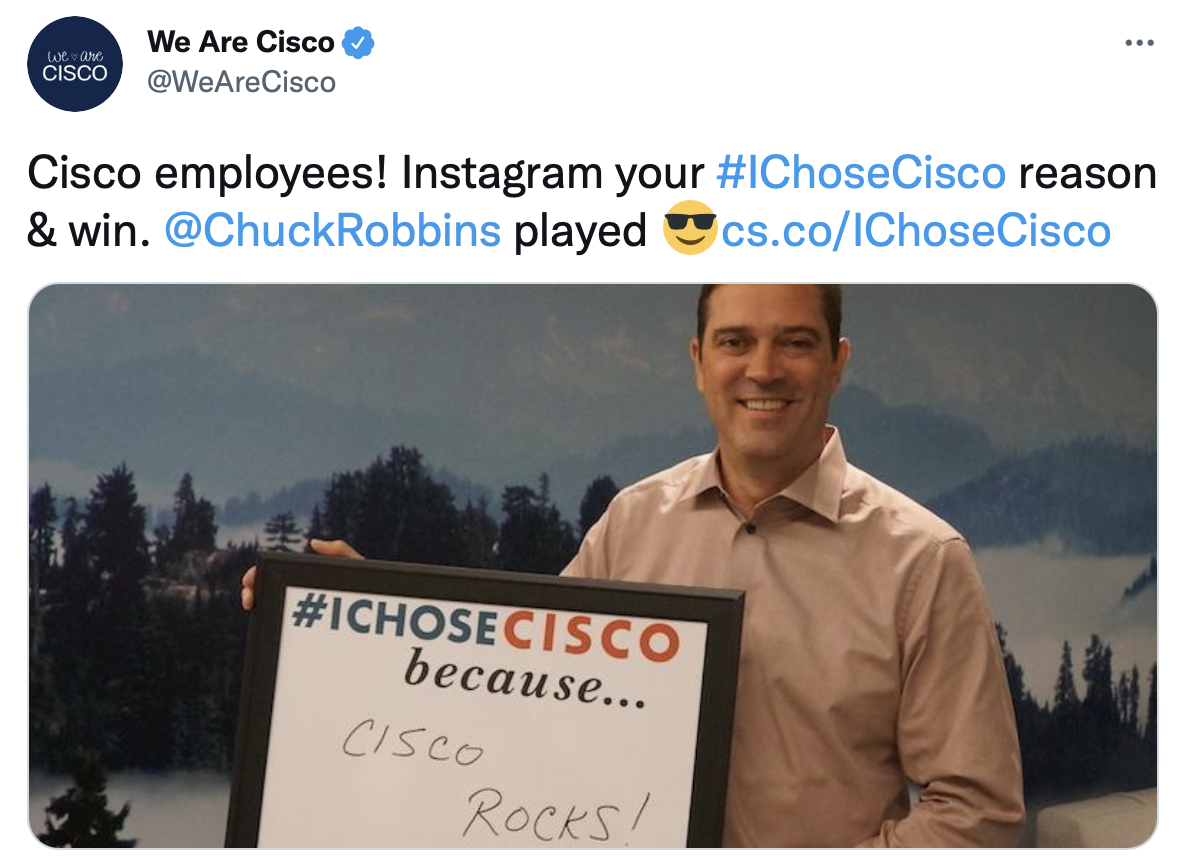
For example, when Cisco launched its #IChoseCisco campaign, many executives — including CEO Chuck Robbins — participated.
Employees’ Role in Employer Branding
Last but certainly not least are the rest of your employees.
Empower them to become advocates.
As we said above, employees themselves are the most important contributors to your employer brand.
Why? Because their thoughts and opinions about the company are far more credible than what the CEO, marketing, or HR has to say. People trust actual people — not press releases, recruitment ads, and corporate social handles.
That’s why it’s so important to empower workers to become true employee advocates and encourage them to post about the company on social media.
After all, employee social posts reach a 561% bigger audience than official brand channels, and their content gets eight times more engagement than posts shared by brand handles.
The key to this impressive reach and engagement lies in employees’ authenticity though, so organizations shouldn’t dictate what employees post or set up automatic sharing.
Instead, they should simply arm employees with great content and make it a breeze for workers to share it to their personal networks.
That’s where EveryoneSocial comes in.
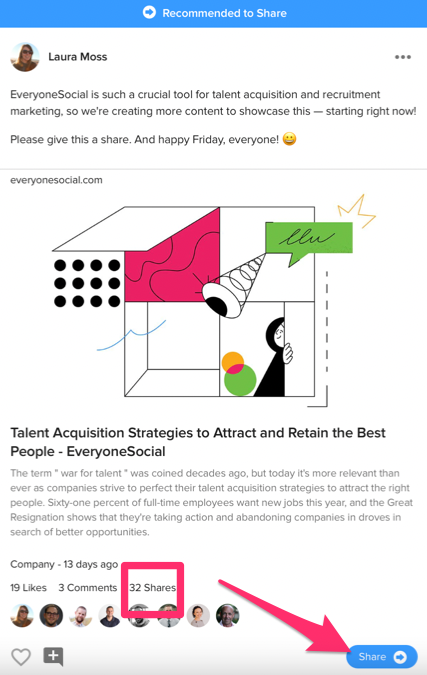
Our pure play employee advocacy program organizes all your content in one central location, and employees can share it to their personal networks with just the click of a button. They can post with the suggested copy you provide, or you can allow them to craft their own share copy in their voice.
And that’s just the beginning of what EveryoneSocial can do.
EveryoneSocial Will Supercharge Your Employer Brand
There’s a reason why top brands like T-Mobile, Facebook, and Qualtrics rely on EveryoneSocial to improve and communicate their unique employer brands.
Take a tour of our product to see what it can do for your brand.














